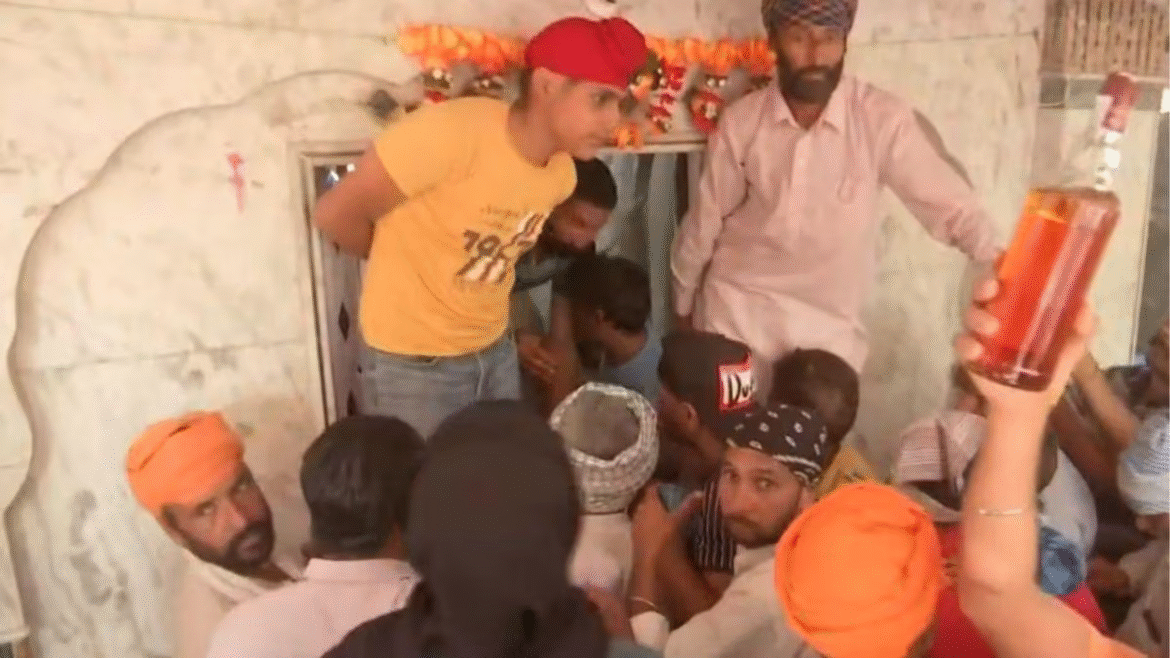AI Generated Summary
- At dawn, as the Tribune team observed, a group of locals lingered near the shrine gates, waiting eagerly for devotees to emerge—perhaps not just for the unusual prasad, but for a glimpse of faith that transcends custom.
- At the shrine of Smadh Baba Roda Ji in Wadala Veeram Bhoma village, devotees offer bottles of liquor—not as indulgence, but as gratitude.
- The bottles, regardless of brand or make, are poured into a large container, stirred together, and then distributed among the faithful as a symbolic blessing.
In a small village near Amritsar, devotion takes an unusual turn. At the shrine of Smadh Baba Roda Ji in Wadala Veeram Bhoma village, devotees offer bottles of liquor—not as indulgence, but as gratitude. From childless mothers seeking blessings to the unemployed praying for work, people from all walks of life arrive with faith in their hearts and bottles in their hands.
The ritual, practiced for over a century, defies convention and yet unites hundreds. Once a wish is fulfilled, devotees bring liquor as prasad—a sacred offering. The bottles, regardless of brand or make, are poured into a large container, stirred together, and then distributed among the faithful as a symbolic blessing.
A Tradition Rooted in Faith
Caretaker Gurnek Singh, a descendant of Baba Roda Ji, explains that devotees travel from as far as Himachal Pradesh to pay homage. “Baba Roda Ji never consumed liquor himself,” he clarifies, “but he accepted it as a humble gesture of gratitude.”
Legend traces the practice to a villager named Ujagar Singh, who once prayed to Baba Roda Ji for a child. When his wish was fulfilled, he offered five bighas of land in thanks. Baba Roda Ji declined, instead asking him to donate a bottle of liquor daily as long as he wished. The simple act became a lasting tradition.
The Saint Who Cured and Counseled
Born into a landlord family in Dhiman Damodar village (Gurdaspur district), Baba Roda Ji chose a life of celibacy and devotion. Settling near Bhoma in 1896—where his sister lived—he dedicated his life to healing the sick and comforting the distressed. Devotees believe he passed away in 1924, but his spirit continues to bless those who visit his samadh (shrine).
Even today, people pray for everything—from jobs and legal victories to marriage harmony and overseas visas. Every Sangrant (first day of the Punjabi month), a continuous ghee lamp burns at the shrine, and langar (community meal) is served to all visitors.
A Celebration of Faith and Unity
Every year, the shrine comes alive during a two-day fair beginning March 23. Men, women, and even children participate without distinction of caste or creed. Despite liquor being taboo in many faiths, here it symbolizes shared devotion rather than indulgence.
A sports club named after Baba Roda Ji also organizes tournaments during Baisakhi, adding another dimension to the saint’s legacy of unity and goodwill.
As Gurnam Singh from Adalatpur, a regular devotee, puts it, “The shrine showers blessings on those who come with pure hearts. That’s why our family has been visiting for generations.”
At dawn, as the Tribune team observed, a group of locals lingered near the shrine gates, waiting eagerly for devotees to emerge—perhaps not just for the unusual prasad, but for a glimpse of faith that transcends custom.




